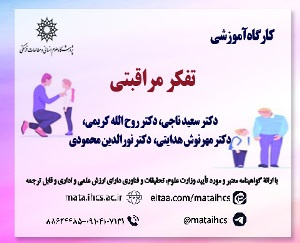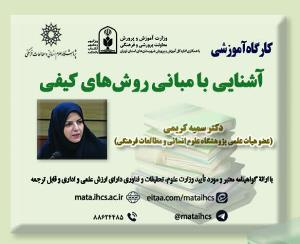ببررسی اثر منفی تحمیل عواطف ناهمخوان بر سلامت روان شناختی و تعهد عاطفی کارکنان: نقش تعدیل گری هوش هیجانی و سرمایه ی روان شناختی (مقاله علمی وزارت علوم)
درجه علمی: نشریه علمی (وزارت علوم)
آرشیو
چکیده
با توجه به اهمیت مدیریت احساسات و هیجان ها در محیط کاری، مطالعه ی حاضر با هدف تعیین تأثیر تحمیل عواطف ناهمخوان بر سلامت روانشناختی و تعهد عاطفی کارکنان با نقش تعدیل کنندگی هوش هیجانی و سرمایه ی روان شناختی انجام گرفت. در این پژوهش پیمایشی، 121 نفر از کارکنان شعب بانک مسکن اهواز شرکت نمودند. جهت جمع آوری داده ها، از روش تصادفی چندمرحله ای و از پرسشنامه های تحمیل عواطف ناهمخوان، سلامت روانی، تعهد عاطفی، هوش هیجانی و سرمایه ی روان شناختی استفاده گردید. داده ها با روش ضریب همبستگی پیرسون و تحلیل رگرسیون همزمان و با استفاده از نرم افزار SPSS-22 تحلیل شدند. نتایج حاصل از تحلیل رگرسیون نشان داد که تحمیل عواطف ناهمخوان نقش معنی داری در کاهش سلامت روانی و تعهد عاطفی کارکنان دارد. علاوه بر این، هوش هیجانی و سرمایه ی روان شناختی توانستند رابطه ی میان این متغیرها را تعدیل کنند. به عبارت دیگر، هوش هیجانی و سرمایه ی روان شناختی توانستند اثر تحمیل عواطف ناهمخوان را بر سلامت روانی و تعهد عاطفی کاهش دهند. بر این اساس، پیشنهاد می شود برای کاهش اثر تحمیل عواطف ناهمخوان بر سلامت روانی و تعهد عاطفی کارکنان سازمان ها باید مجموعه ای از برنامه های آموزشی به منظور افزایش هوش هیجانی و سرمایه ی روان شناختی، طراحی و اجرا نمایند.Investigating negative effect of imposing dissonance emotions on mental health and affective commitment of employees: The moderating role of emotional intelligence and psychological capital
Introduction Regarding to today's competitive world and the key role of human resources in the success and failure of organizations and the importance of employees' emotions in their mental health and their psychological well-being, this study aimed to investigate the effect of imposing dissonance emotions on psychological health and emotional commitment of employees, with the moderating role of emotional intelligence and psychological capital. The emotional labor was first introduced in 1983 by the American sociologist Hochschild, and then attracted much attention. Hochschild (1983) believed it has two types: surface acting and deep acting. Surface acting occurs when a person expresses particular emotions without really experiencing them. In other words, the person adjusts the feelings that he expresses and considers himself merely as an actor. On the other hand, a deep acting occurs when a person experiences the feelings he expresses. Hochschild (1983) stated that managing occupational excitement (deep acting) requires a lot of effort and it costs a lot to the person. Mental health is one of the variables that dissonance emotions can affect it. Carl Menanger's (1990) definition of mental health is that the individual compromises with the world around him/her as much as possible, so that his/her effective and beneficial happiness can be fully realized. Another factor that has been examined as the result of dissonance emotions in this study is emotional commitment. commitment as "the degree of identification of a person with a particular organization and the degree of involvement and engagement with that organization." The emotional commitment refers to the linkage and replication of the employee with the organization. Increasing emotional commitment means increasing the sense of loyalty, belonging, and solidity (Meyer, Allen and Smith, 1993). Considering the existing research background, a number of variables can be considered as moderating the relationship between disagreement with mental health and emotional commitment. In this study, the role of emotional intelligence and psychological capital has been investigated. Method The statistical population of this study was all employees of all branches of Maskan Bank of Ahvaz. Multi-stage random sampling was used to collect the data. In this research, 121 employees of Ahvaz branch of Sepah bank participated. Since the present study was descriptive, Pearson correlation and regression tests were used to describe and analyze the demographic characteristics of descriptive variables such as mean and standard deviation, as well as to test the research hypotheses. The analyzes were performed using SPSS version 22 software. In this study, for collecting data, the questionnaire of the imposition of dissonant emotions (Naring et al., 2000), mental health (Goldberg & Hiller, 1979), emotional commitment (Allen & Meyer, 1990), emotional intelligence (Shot et al., 1998) and psychological capital (Lutans et al., 2007), were used. Results The results of regression analysis showed that the imposition of dissonant emotions has a significant role in decreasing mental health and emotional commitment of employees. In addition, emotional intelligence and psychological capital managed to modify the relationship between these variables. In other words, emotional intelligence and psychological capital were able to reduce the effect of imposing dissonance emotions on mental health and emotional commitment. Accordingly, it is suggested to design and implement a series of educational programs to increase emotional intelligence and psychological capital in order to reduce the effect of imposing dissonance emotions on the mental health and emotional commitment of employees. Conculsion Accordingly, it is suggested to design and implement a series of educational programs to increase emotional intelligence and psychological capital in order to reduce the effect of imposing dissonance emotions on the mental health and emotional commitment of employees.







